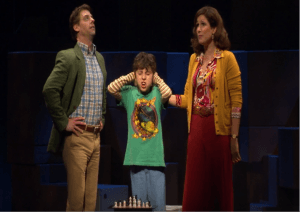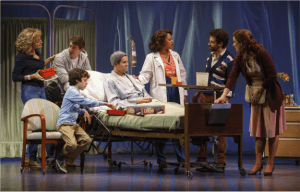By: Taylor Strype
William Finn was the writer and composer of the musical Falsettos. Falsettos was incredibly successful, winning the 1992 Tony Award for Best Original Score along with the 1992 Tony Award for Best Book of a Musical. Finn grew up in a conservative Jewish family in Boston, Massachusetts. He attended Hebrew school and then Williams College as music major, aspiring to be a musical theater writer. Finn is able to draw from his own experiences he faced as an openly gay Jewish man throughout his musicals. Falsettos contains two acts, “March of the Falsettos” and “Falsettoland”, which showed a progression of character development as each character struggled to find themselves. Falsettos is set at the beginning of the 1980’s in New York City during the AIDs epidemic. The musical begins with a Jewish father, Marvin, leaving his wife Trina for another man Whizzer. Even though Marvin leaves his family, he still strives to maintain a close relationship with his son, Jason. During this time of significant social change, each character struggles to cope with tolerance and acceptance of a new family dynamic. Throughout Falsettos, Finn examines a what was thought as a nontraditional family unit. Finn explores how as a young adolescent, Jason is confused about his father’s homosexuality and his struggle to connect with him. He also demonstrates the impact that the AIDs epidemic had on the gay community.
Despite leaving Trina for Whizzer, Marvin still wants to maintain a traditional family dynamic. During the song “A Tight Knit Family” Marvin sings, “But I want a tight-knit family, I want a group that harmonizes, I want my wife and kid and friend” (Act I Falsettos). While Marvin aspires to have a tight-knit family, he is having trouble achieving it. Throughout the musical he was conflicted about wanting to be part of his family but also being with Whizzer. Trina and Marvin try to reestablish a family unit but continuously fight over the role of their significant other. Many people believed that the traditional Jewish family included a Jewish man and women with biological children actively involved in the Jewish community. Falsettos challenges what a traditional family was due to the new societal changes such as divorce, remarriage and same sex spouses during this time. While many people believed a Jewish family should be a nuclear family, “Conflicts between communal values and individual desires, intermarriage, and the difficulties posed by a single parenthood, divorce, and women working outside the home were all problems addressed by the historical tradition” (Biale 134). Although family related issues were becoming more prevalent during the 1980’s, they have always been an issue. While nuclear families are glorified, they have not always represented traditional Jewish values. Falsettos brings this misconception to light by contradicting what a traditional Jewish family was thought of as.
Jason found it difficult to come to terms with his father’s homosexuality. He was worried that since his father was a homosexual that he would be one too. Trina also felt responsible for Marvin’s homosexuality. She was distraught over the divorce and begins to have a breakdown. In the song “Breaking Down”, Trina admits to her family falling apart. Trina expresses her animosity toward Marvin and Whizzer’s relationship. Both Jason and Trina struggle to cope with Marvin’s sexuality. In order to unite the family, Trina and Jason will need to accept Marin’s homosexuality. Homosexuality was not accepted during this time. In the 1980’s, a gay Jew was upset with David Novak for speaking against homosexuality in his synagogue. Novak responded by saying “…that Judaism cannot agree with the point of view of homosexuality activist and their sympathizers that homosexuality is as acceptable a moral option as heterosexuality” (Novak 1). The Jewish community did not accept widely accept homosexuality at this time. Novak believed that it was a sin to be both homosexual and Jewish. Due to the intolerance at this time, Jason and Trina had a hard time coping with Marvin’s sexuality.
Finn was able to show how AIDs impacted the gay community. During a game of racquetball, Whizzer collapses. Whizzer is admitted to the hospital with an unknown illness. During this time, young gay men are arriving at hospitals with a mysterious illness. Although it is not explicitly stated, Whizzer has AIDs. During the song “Something bad is happening”, Dr. Charlotte, sings, “Something very bad is happening! Something stinks, something immoral! Something so bad that words have lost their meaning!” (Act II Falsettos). Although Dr. Charlotte does not know what the disease is, she is aware of the ramifications of it. She begins to see a pattern among the illness and implies that Marvin might be at risk as well. Whizzer illness brings the entire family together. Unfortunately, Whizzer illness is terminal and he dies. Due to the lack of response to the AIDs epidemic by the federal health system, the gay community sparked activism. They wanted to “…attain the same standards of medical treatment, data collection, and research for AIDS as for people afflicted with other types of illness is connected to the activist, cultural, and community-building processes of gay men and lesbians throughout the decade” (Fetner 51). Since AIDs was primarily impacting the gay community, it was not a priority to find a cure. Finn establishes in Falsettos that the doctors did not know or have the resources to combat the disease. By exposing how much the doctors were inept to deal with the disease, Finn was able to show how AIDs impacted the gay community.
Finn was able to create a groundbreaking musical that exposed the struggle of the gay community during the AIDS crisis. He shows the development of each character throughout the musical. Jason grows up and realizes the importance of his family and his religion. Marvin and Trina come together to support Jason and Whizzer at his death. Marvin and Jason mend their relationship. Falsettos challenged many of the cultural Jewish norms during the 1980’s. Overall, Finn emphasized the importance of creating tolerance and acceptance within society no matter a person beliefs, sexual orientation, or family dynamic.
Works Cited
David Novak. On Homosexuality: To Robert Schwartz. Sh’ma: A Journal of Jewish Ideas. Eugene Borowitz.Nov 14 1980: 3-5. #https://www.bjpa.org/search-results/publication/7707
Fetner, Tina. “Organizational Development through the 1980s.” How the Religious Right Shaped Lesbian and Gay Activism, NED – New edition ed., vol. 31, University of Minnesota Press, 2008, pp. 44–63. JSTOR, www.jstor.org/stable/10.5749/j.ctttvb8d.7.
William Finn, Falsettos, Act 1 (M arch of the Falsettos).
Finn, F alsettos, Act II (Falsettoland).
Isherwood, Charles. “Review: ‘Falsettos,’ a Perfect Musical, an Imperfect Family.” The New York Times, The New York Times, 28 Oct. 2016, www.nytimes.com/2016/10/28/theater/falsettos-review.html.
Shofar: An Interdisciplinary Journal of Jewish Studies, Volume 14, Number 4, Summer 1996, pp. 171-174 (Review).


